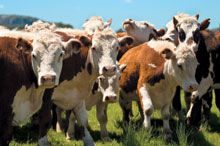China to build worlds largest animal cloning facility
Facility aims to produce cattle, racehorses and pet dogs.
The city of Tianjin, China, will soon be the home of one of the world's largest animal cloning centers, as a result of a joint Chinese-Korean venture that will commence operations in the first half of 2016. The $31 million facility aims to eventually produce up to one million cloned calves per year, as well as dogs, racehorses and critically endangered species, according to the International Business Times.

Are these cattle facing the attack of the clones?
The center is being built by Sinica, a subsidiary of Boyalife Group, which focuses on stem cell research and regenerative medicine; the Institute of Molecular Medicine at Peking University; the Tianjin International Joint Academy of Biomedicine; and South Korea's Sooam Biotech Research Foundation, which is run by Hwang Woo-suk, a scientist who was found to have faked findings in a major stem cell study in 2006, according to the International Business Times.
The Boyalife Group said in a press release that it initially hopes to produce 100,000 cow embryos, eventually increasing to one million, to “produce enough beef cattle to meet market demand,” as Chinese farmers are struggling to keep up.
Besides producing livestock to help with China's growing demand for meat, the facility also aims to produce produce cloned racehorses and dogs and to help clone endangered species on the brink of extinction, the International Business Times states.
Growing demand for meat aside, the facility raises ethical questions says Robin Downing, DVM, DAAPM, DACVSMR, CVPP, CCRP. “Animals have received increasing recognition as moral beings, needing and deserving moral consideration that includes (but is not limited to) their lifestyles, a commitment to providing them with enriched environments, and providing them the opportunity to express their preferences. Animals are likewise garnering greater recognition that they are, in fact, sentient, possessing consciousness that deserves recognition. ‘Mass producing' sentient beings flies in the face of the most fundamental attention to moral detail,” she says.
The ASPCA has identified five freedoms of animal welfare:
• Freedom from hunger and thirst
• Freedom from discomfort
• Freedom from pain, injury or disease
• Freedom to express normal behavior
• Freedom from fear and distress.
The press release does not state how the needs of these cloned animals would be addressed, Downing continues, “including how they would be nurtured, since the sheer volume of farm animal creation alone suggested by the news would overwhelm any current farming facility. Surely there is no way, under such circumstances, to provide for these basic and fundamental freedoms to these animals,” she says. “To date there has been little success in the cloning world of creating animals that are healthy and who enjoy a lifestyle consistent with what would be considered natural for them. We are left with questions about what sort of health profile, and, consequently, what kind of quality of life these animals would have.
Another thing important to keep in mind, Downing says, is that one of the scientists that will play a key role in the facility has been discredited for faking results. “It is wise to remain skeptical,” she says. “It is equally wise to recognize the ethical implications of commercial activities such as these at a time when we are re-examining traditional farming practices due to increasing interest in how animals are being managed.”
Robin Downing, DVM, DAAPM, DACVSMR, CVPP, CCRP, is the hospital director of Windsor Veterinary Clinic and The Downing Center for Animal Pain Management in Windsor, Colorado.